

Peter Robins entered ‘A Nice October Day’ into a 1977 playwriting competition sponsored by the August Trust in conjunction with Gay Sweatshop. The brief was to write a one-act play which highlighted the situation of older lesbians and gay men.
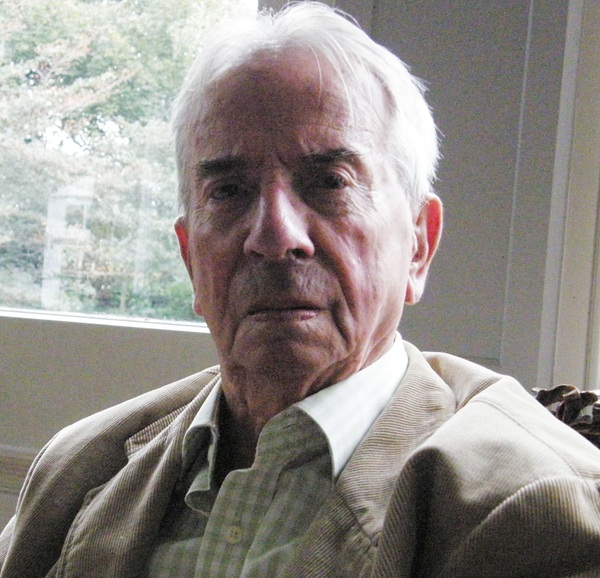
There were some twenty entries; the winning play was ‘Moonlight in Edmonton’, and the prize was £100 plus a ‘professional’ production at the 1977 Conference of the Campaign for Homosexual Equality [CHE] by Gay Sweatshop Theatre Company.
To unravel some of the elements, The August Trust was set up to improve the situation of older gay men, it did little for lesbians, following a research project organised by the West End local group in 1973-74. The Chair of the group was Griff Vaughan-Williams. It was an ill-researched effort with a very small sample, some 50 people feeling lonely and sorry for themselves.
To the eyes of the 2020s, it is patronising to the point of insult, presenting older people [‘aged gays’ is the cringe-making term] as passive and helpless objects of pity. Since the entry point into this category seems to be somewhere around 55, and the universal complaint is of loneliness, the reaction most provoked seems to us now to be ‘get off your arses and do something for yourselves.’
Tangentially I remember as an organiser of the Oxford Gay Action Group in 1973 hearing a talk by a white-haired member of the town CHE group about the ageism of the gay scene, and how we seemed to become at best invisible and at worst repulsive after the age of forty. We were young, earnest and full of ideals about brotherhood and liberation.
We took the message very seriously, and for many weeks afterwards went out of our way to court the older wallflowers at our weekly discos at the Cape of Good Hope. We assiduously went to bed with these excluded victims, as they presented, until we discovered that none of them seemed interested in going to bed with each other. It seemed rather a one-sided arrangement. Still, at least we discovered the charms of a blow job given with gums.
But I digress. Throughout the report, and the subsequent August Trust campaign, the approach was always about doing something for ‘aged gays’ rather than with them. The battle cry of the disability movement, ‘Nothing about us without us’, was unknown at this time.
The August Trust was set up to act up to combat loneliness by providing queer-only accommodation through a housing association. It was a tiny organisation, a committee of five, the most active member of which was Griff, a Welsh Press Officer for the Institute of Mechanical Engineers.
These five people first tried to get charitable status for the Trust but foundered on the Law Lords’ judgement that homosexuality in general was ‘legal but not lawful’. In certain circumstances it would not be prosecuted, but it was not endorsed as a ‘good thing’. As a result of that ruling1 no organisation providing services specifically for gays got charitable status for the next thirty years.
Having failed to get charitable status, they explored the possibility of setting up a housing association, which proved a nightmare of legal complexity and hideous expense. Eventually, in 1978, they took one over, but with no great enthusiasm from the gay community to animate it.
Apart from starting the September Group in 1978, a small social group meeting under the umbrella of FRIEND2, there was nothing to show for the August Trust and its avowed aims were quietly forgotten until Tonic Housing put serious money and expertise into housing for older people in the last ten years.
However, the one thing CHE was proficient at was raising money for the trust through local groups with raffles, discos, and 'bring and buy' sales. By the start of 1977 it had accumulated over £3,000 (£36,000 in 2025 money). The domineering Griff pushed through the idea of the playwriting competition and persuaded Gay Sweatshop to partner the Trust.
They would provide half the judges of the competition and would mount the winning script. Sweatshop in turn would premiere its new play, ‘As Time Goes By’, at the conference as well.
To be blunt, Sweatshop took them for a ride. First, the winner they chose was not by any standards the best of the scripts on offer, and Griff vowed that the next time the judges would all be from the Trust. Second, they decided that they couldn’t mount the show, and the best they could do was a bit of publicity. Even this they failed to provide, because they were wholly focussed on ‘As Time Goes By’, which sucked in all the oxygen of promotion.
In the end, CHE came to the rescue and called in a favour from theatre director Bill Pryde to cast and direct ‘Moonlight in Edmonton’, which had three performances in Nottingham at the Conference, before being consigned to oblivion. There were no photographs, no play programme and no reviews.
At the end of the year they posted that they had lost £2,000 out of their kitty, of which £1,500 was attributed to the Sweatshop venture and £500 to a disastrous ‘fundraising’ riverboat trip. Griff was notorious for losing large amounts of money on projects which were meant to do the reverse.
It was a good job they hadn’t achieved charity status because the Charity Commissioners would have been justified in querying why so much of the Trust’s income had been spent on something so marginal to providing facilities for older LGBT+ people.
It still stands as an indictment of the lack of accountability in the gay movement, and the lack of curiosity in both the gay press and among supporters, that no-one seems to have asked questions about it. Over £1,000 was never accounted for.
Of the entries into the August Trust competition, most didn’t meet the basic requirements of length, practicality or subject matter. Of those that did, none apart from Peter’s showed a community stepping in and taking care of its own.
In the play Geoff and Penny, a younger couple, take 70-year-old Robert Adamson under their wing when the Council wants to force him into an old people’s home. In the 1970s, the age of 70 was seen as impossibly ancient3. This concept of the gay community providing its own security umbrella was one which Peter had posited in a joint pamphlet, written with Brian Sewell4, for CHE in 1972.
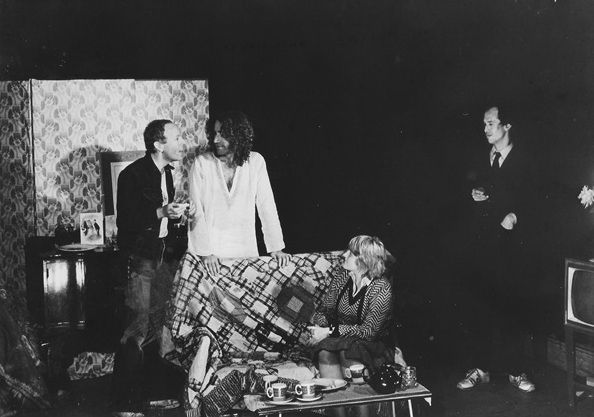
When CHE started organising in London in June 1970, it created groups haphazardly, with no geographic integrity. When one group filled up to 30, another one was started. They were numbered 1 to 11. In 1973 they turned into area groups. Brian was convenor of London 2, Peter of London 3. London 8 became London West End.
Peter’s 'A Nice October Day' was far and away the best script and fitted squarely with CHE concerns. It’s something of a mystery why Moonlight won. I suspect nepotism. When he brought it to us, two years after the competition debacle, he was still bitter.
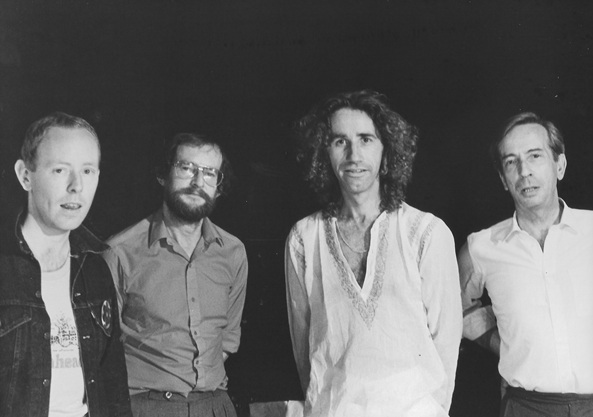
We had reservations about it, its ending seemed too glib, but maybe that had to be rushed through to fit the time slot. It also used its (female) social worker as something of a whipping girl, with just the faintest whiff of sexism.
Peter was in his 40s and worked as a BBC radio producer. He’d started adult life as a PE instructor, been a war correspondent in the Middle East, and drifted into the BBC in the late 1960s, producing in turn the Today programme under Jack de Manio, and The World at One with former editor of The Daily Mail, William Hardcastle.
He finally came to rest in Yesterday (or Today) in Parliament, a flagship programme which is now nearly eighty years old and the only programme the BBC is required to make under its charter.
Peter was a secular Jew, slightly camp, quite glamorous very loud and we were in awe of him. He was also promoting his book of short stories, 'Undo Your Raincoats and Laugh', at the time. However, he stayed away from rehearsals, posed for photos and said nice things about the production. What more could a company want from an author!
The venue was The George, at the bottom end of the Liverpool Road near Chapel Street Market, and the dates were in June 1980. This was the third and most substantial part of a triple bill. The images include Bruce Attwood, who was originally scheduled to play Robert.
Publicity Leaflet - Front and Back
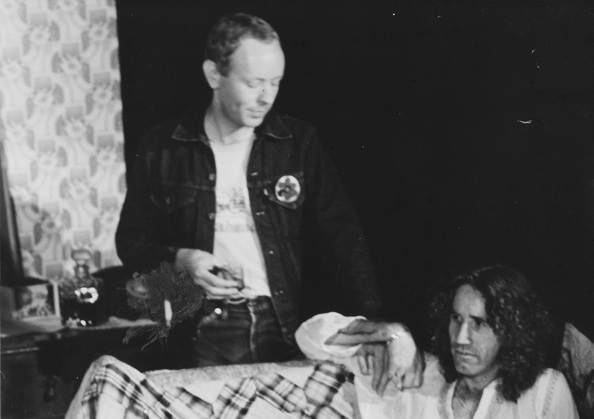
However he struggled to remember lines, and eventually I took over from him. However, his memory picked up sufficiently for him to return to the company as the original Peascod in Teatrolley. Barry Scanes as Geoff became a regular for several years, in particular premiering the main character in the pioneering 1983: AntiBody.
I confess I stole from 'A Nice October Day' when it came to writing Autumn, the 1973 section of A Gay Century. I wanted a more colourful backstory for the protagonist, a bigger generation gap culture clash, a conflict between the two young characters, and a sense of history. You can compare the two by going to the script of 1973: Autumn.
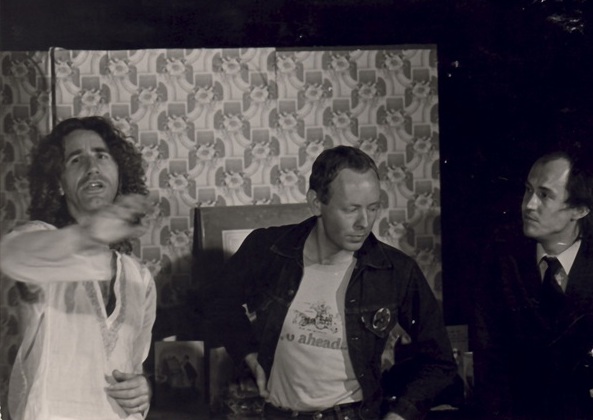
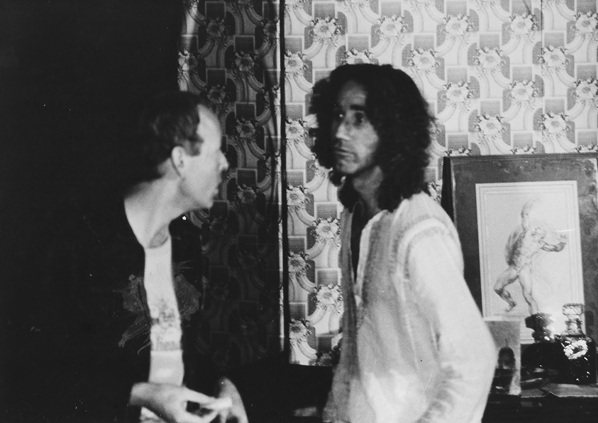
Read the Script
Footnotes:
Peter Scott-Presland
April 2025.